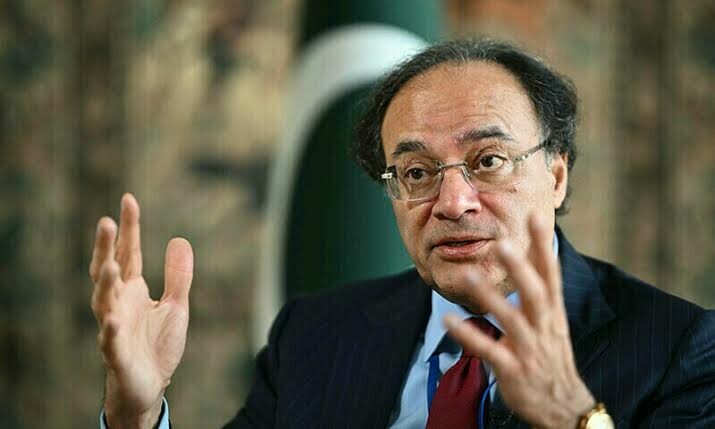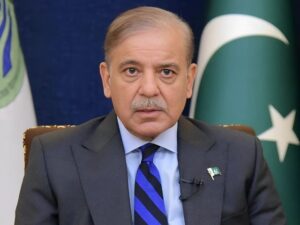• Minister stresses need for ‘DNA change’; says database to be utilised to identify tax evaders
• After Islamabad, Lahore and Karachi airports to also go under the hammer
• World Bank agrees to provide grant for capacity-building
WASHINGTON: Not trading with your neighbours doesn’t make sense, Finance Minister Muhammad Aurangzeb said on Sunday, when asked a question on increasing regional trade, particularly with India.
Speaking at a wide-ranging presser, held at the Pakistan Embassy in Washington, he clarified that while “political connotations” or “geopolitical issues” affecting regional trade were outside his purview, Pakistan was “already engaging with its neighbours”.
He noted that all intergovernmental organisations effectively serve as “regional corridors,” citing examples from south-east Asia and the countries of the South Asian Association for Regional Cooperation (SAARC).
“We recently attended the Shanghai Cooperation Organisation (SCO) conference and are keen to join the BRICS alliance because we seek to expand trade,” he added.
Mr Aurangzeb has been in Washington to attend the annual meetings of the International Monetary Fund (IMF) and the World Bank Group over the past week.
Sharing insights from his discussions with international financial leaders, rating agencies, and US business representatives, he reported that all had acknowledged Pakistan’s economic progress, particularly in reducing inflation. He credited government reforms for these gains, noting that foreign exchange reserves have risen to over $11 billion.
The minister added that US businesses had shown strong interest in investing, and international lenders have agreed to a one-window approval process for projects in Pakistan.
World Bank grant
Mr Aurangzeb also told the news conference the World Bank had agreed to provide a grant to Pakistan for capacity-building projects.
“It will be a grant, not a loan,” he stated, highlighting key points from his discussions with international lenders and financial leaders in Washington.
The World Bank’s International Development Association (IDA) provides grants and low-interest loans to countries at higher risk of debt distress, with no repayment requirement on grants.
The minister also announced that Pakistan would soon enter a ten-year Country Partnership Agreement with the World Bank, focusing on critical challenges such as climate change, child stunting, and access to education for out-of-school children.
A World Bank Country Partnership is a strategic framework that guides the bank’s engagement with a nation over a set period. Designed in alignment with government development priorities, it provides a roadmap for World Bank initiatives and measures their impact on the country’s progress.
Mr Aurangzeb added that Pakistan has begun discussions with the IMF as well on climate resilience financing, emphasizing that “anything less than a billion dollars would not be meaningful.”
When asked about the major challenges to economic growth, the minister identified Pakistan’s rapidly growing population as the most significant threat to economic stability. He attributed this growth to heightened resource strain, rising unemployment, and declining per capita income.
Tax collection
The finance minister reiterated Pakistan’s goal to make the current IMF program its last, contingent on continuing with the stated reforms. “We need a DNA change. We need an export-oriented economy, not an import-oriented economy,” he said.
He also underscored efforts to expand the tax net and improve tax collection.
“We have a database of individuals we believe should be paying taxes, and we will utilise this to ensure tax enforcement and compliance,” Mr Aurangzeb stated.
“We will no longer allow tax evaders to escape with just a penalty; there will now be consequences for non-compliance.” He also announced that the government would soon introduce a new law prohibiting non-filers from purchasing cars and properties. “We do not want to victimise anyone, but we will not tolerate tax evasion,” he affirmed.
The government aims to raise the tax-to-GDP ratio from 9pc to 13pc, supported by reforms within the Federal Board of Revenue (FBR).
Privatisation
When asked about the timeline of privatisation of state-owned entities (SOEs), the minister said many ministries had come before cabinet committee on SOEs and made pleas regarding their “essential or strategic” assets.
“We had discussions with them and said let’s put it into the privatisation pipeline, so we have sent them to the cabinet committee on privatisation, which in turn has sent it to the privatisation commission.”
He said they were not just looking at institutions that were a “drag on the exchequer”, but also those which are ‘profitable’.
For example, he mentioned the case of State Life Insurance Corporation. “There were many questions asked, like, ‘This company is profitable so what is your problem?’ The problem is that if this can be done by the private sector, why should be keep it public?”
“PIA and Islamabad airport are the two assets [whose privatisation] is in the works. This involves a detailed discussion on due diligence and technical evaluation, so we are hopeful that during November, we will get to a good outcome in terms of decisions,” he said.
“But we don’t want to stop there; if [the sale of] Islamabad airport is successful — and you know that the International Finance Corporation in terms of that sell-side mandate, so we told them to look at Lahore and Karachi airports as well. Preparatory work on that is already underway and as soon as Islamabad airport reaches a conclusion, these airports should come into play right away.”
Published in Dawn, October 28th, 2024











